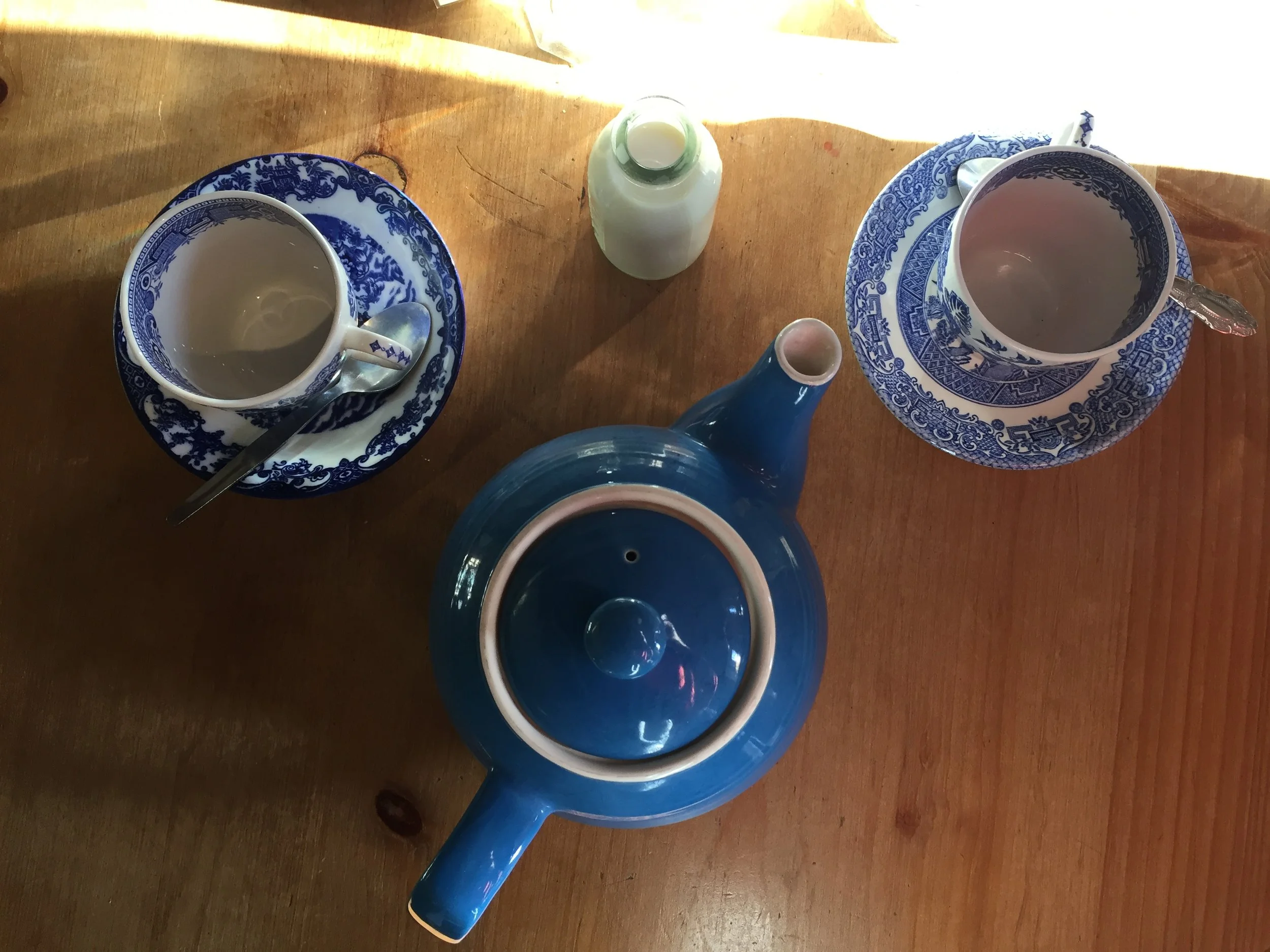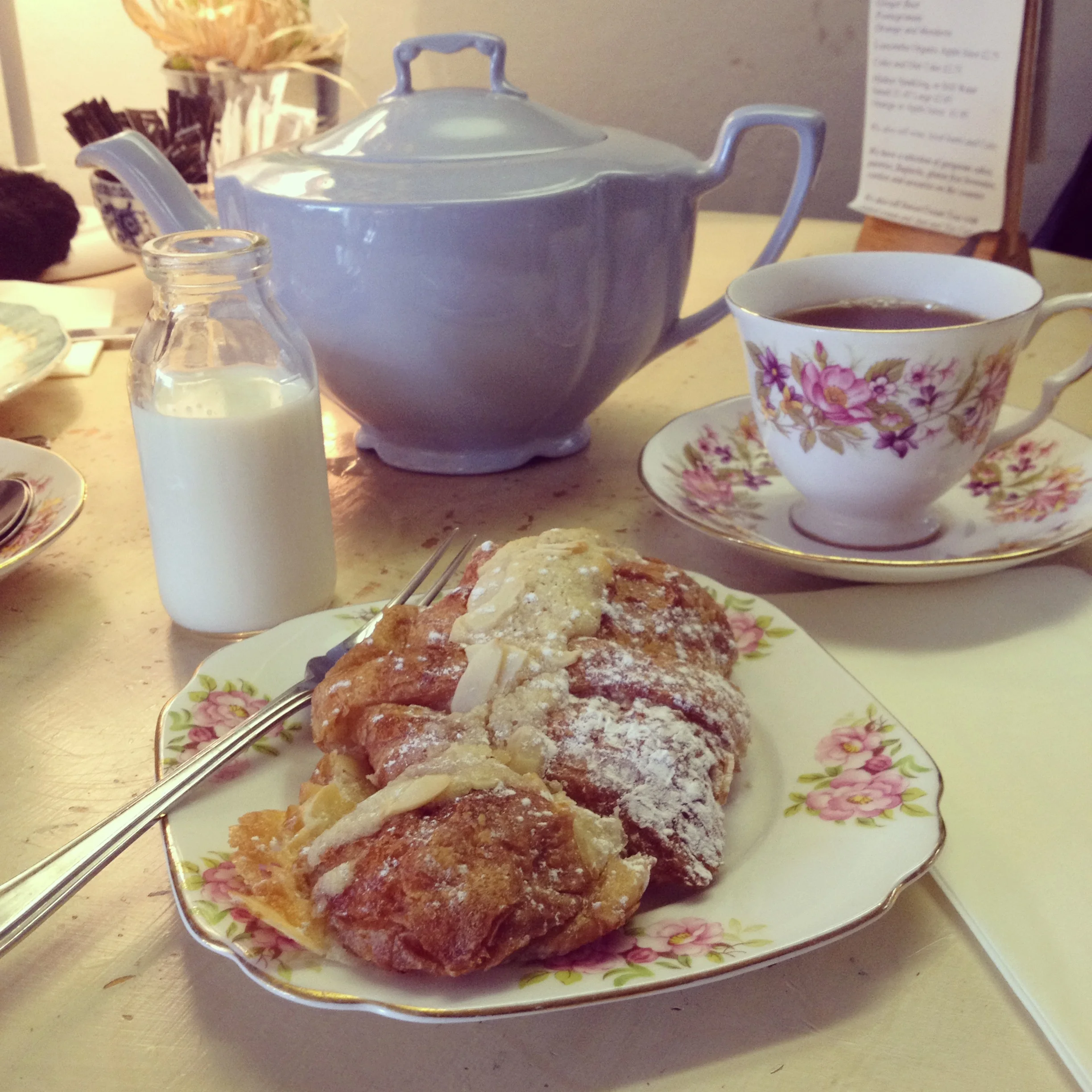I’m about to board another flight to London. I seriously can not wait for scones and tea at No. 9 on the Green in Wimborne. I am visualizing pouring cream into a saucer as I write. Heaven.
I have a suitcase filled with long skirts, a wooden distaff, special rocks, wellies, and an air purifier. Not the most obvious choices for a trip to England. Ok, the wellies get a pass, but they’re so damn heavy and awkward. (Please don’t tell me to wear my weight on the plane. You ever try wearing knee high rubber boots 7 miles over the ocean?) I’m on my way to the Sacred Trust, a school for shamanism, deeply rooted in the Path of Pollen, a European shamanic tradition with the honey bee at its heart. The air purifier is just because I’m allergic to mold. Go figure.
People have started to ask me if I live part time in Europe. I’d LOVE to say Yes, but the answer is, not yet. Since 2010 I have been traveling to the Sacred Trust to study a form of shamanism that survived the Romans, the Dark Ages, and the Inquisition. I equate it to a graduate program. A big investment with my time and money, which is helping improve my mind, body, heart, career and life path. That’s how I justify it to my left brain. My right brain couldn’t give two effs, because this work is 600% soul food.
The school teaches a line of gynocentric, bee-centric shamanism that honors the feminine principal. It is mostly made up of female students, although there are many men starting to take newly offered classes for all genders. It mostly works with bees, but there are serpents, stags and spiders woven in. It is multidimensional and embraces the betwixt and between.
The tradition is a small golden thread. A quiet hum that lasted through the burning of our grandmother’s grandmothers. It’s an answer to my American hunger for spiritual belonging. A hunger that longs for a sense of spiritual roots, but wars with how to be a native Californian without appropriating the spiritual traditions of the Indigenous people of this land. I can not begin to describe the relief I felt when my heart encountered the bee tradition and I cried those soul-aching tears of recognition, knowing that somehow, not all had been lost.
Let’s unpack that for a moment. First and foremost, I need to address privilege. I’m a white, western woman. My ancestors are oppressors and I carry that in my lineage. I refuse to be blind to my own privilege, and as a result of that refusal, I keep discovering ways that I have been. Let me just state that I am learning and I have a long way to go. Also, I fly over an ocean 1-3 times a year in the pursuit of earth-based wisdom connected to the part of my ancestry that was oppressed by Patriarchy and Christianity. So while I resist the dominant social institutions of the former two powerhouses, I am also partaking in the hypocrisy of the entire capitalist, planet-degrading #deathspiral, by using fossil fuels to catapult me in a metal box to a place where I can feel connected to the earth. That’s some real bullshit right there.
Yet, I also subscribe to the idea that there are certain soul places on this earth. Certain spots that speaks to us. Speak through us. Calls us. Awakens us. Claim us. Can a person be OF their native soil and also OF a patch of earth 6,000 miles from where they first touched their feet to the dirt? I most certainly have been claimed by more than one place in my life. Just are sure as I have been claimed by more than one heart. The English countryside is one of those places. And it requires a good set of wellies.
On with further unpacking. When I say I cried because “not all had been lost”, I mean, I am woman and a member of the gender(s) who were and continue to be shamed, maligned, violated and abused for our sex/identity. The wisdom ways of women and the honoring of the feminine in earth-based traditions were nearly snuffed out in Europe’s long history of violence against the life-bearers. Coming to a tradition rooted in my ancestor’s homeland that honors the voice of the womb and the power of the feminine principal is cathartic, to say the least. We ascribe voices to various body parts all the time, but when was the last time you considered the womb to have a voice? Not just the heart, or the head or the phallus, but the womb? Think about it.
Now imagine if you found a place tucked between meadow and forest where you were encouraged speak with that voice. Dance with that voice. See with those eyes. Utter with that yonic intelligence. Imagine relearning your body as though it were flowing with nektars, like a flower. Imagine learning new tongues informed by wind, sea, honey and fire. For those of you who have been wondering why my feed is periodically filled with photos of tea and cobblestones, that is why.
What is The Path of Pollen? I can’t really answer that. It is indefinitely ancient and ever new. It’s part of a very old story. It’s part of writing a new story. Its fingers are made of threads, its head made of stars, its womb made of bees, its longing made of serpents entwined. It is wombic. It is phallic. It is Both And. It is Neither Nor.
I am part of a tradition that stretches its storylines back through the distaff path of ancient Europe. It is a tradition of bee women, known as Melissae, and is very much alive and well in the modern world. The Melissae were the bee priestesses of ancient Greece, most commonly connected to the oracular Temple of Delphi. The Delphic Oracle, also called the Delphic Bee or Pythia (pythoness), was the prophetess for the Earth and of the Earth. It is said the priestesses inhaled the breath of the Dragoness, Python, Gaia’s daughter, and entered a trance, uttering prophecy for all who came to the temple.
I am here to remember how to listen to the voice of the earth, as she arises, a buzz, from within. Ten thousand bees offering nectar on the breath of python. May I be so lucky to glimpse her in the mirror.
And I’m here for tea, scones and whisky, because I’m multidimensional AF.



I just love how you write everything I feel and think. like. all. the. time… xxoo miss you
aw! Miss you too! thanks for this dear.
Thank you so much for this post! I am just beginning on my Path of Pollen and your words are an inspiration, validation and re-remembering as I plan to fly multiple times a year across the world to learn to embody this medicine.
You’re welcome. I hope your journey brings you every closer to the liminal threshold of becoming.
The tea shoppe sounds lovely, as do your travels. How wonderful to have found a place to which you belong so far a way! It seems both straightforward and paradoxical. As a fellow Californian I understand your commitment to not appropriate native practices. I do hope that Buxton and his teachers are now being honest with the fact that The Path of Pollen is something Buxton made up, that it’s not ancient in any direct way, and that he stole the material from What the Bee Knows by PL Travers.
I’d really be keen to hear more about this. I don’t mind made up traditions, but I don’t like people claiming things which are not true…
Hi Erica,
You can see my response to Maren’s concerns above. If you would like to hear more I’m always available via email.
Hi Maren,
Thank you for your concern, however it appears you are misinformed about the bee tradition and it’s origins. There is a lot of negative press online about Simon and his book. While I can not speak for him, I can say the following:
1) Simon did not make up the tradition. I know this first hand and from reliable sources. I am a skeptic and very discerning in what I follow. You do not need to believe me, but I do have a direct relationship with this work and have had extended conversations with those passing it on to the world.
2) The bee tradition is a European shamanic tradition with its roots in Britain, Greece and Lithuania. It is taught by women who have been taught by the female elders of these ways who choose to remain out of the public eye. Simon does not teach the courses on the Path of Pollen that are available at the Sacred Trust. Simon teaches other courses on shamanism that include/are influenced by the bee tradition and I hear they are fantastic.
3) There was a falling out between Simon and someone who generated the negative press that you refer to.
4) Simon and the teachers at the Sacred Trust engender my respect and dedication for many reasons, but namely for their sheer integrity, which challenges my own and has helped me grow into someone who’s standards of integrity and transparency are very high.
5) Have you read the book? In the book you may get a better understanding of the context of the PL Travers quote that you refer to. Perhaps this will help? I can not speak for why the quote isn’t given credit, and for this I acknowledge your concerns. It is so important to be discerning in a world of western spiritual starvation and bypass. I get it! However, within the context of the book and where and how it appears, it makes sense to me that the quote wasn’t referenced. The entire book is not directly from PL Travers, but Travers does appear to influence the mentor discussed in the book. I do not think an unreferenced quote (plagiarized) passed on from a mentor giving a lecture in an oral tradition warrants the entire dismissal of that tradition as fabricated. That is only my opinion based on experience of the tradition.
6) What the Bee Knows is a great book. I’ve read both.
Silly question…what kind of air filter do you bring? I am planning on attending the training next year and mould makes me sick….
I use Wynd. It was about $130 and work really great in a small space.
I just finished the path of the pollen. It was quite intriguing. Do you know if the tradition is offered in the United States? Or perhaps more reading material on the subject? The English countryside I’m certain would be the ideal place to learn the tradition but perhaps difficult to travel to for some. Thank you for your response.
Susan